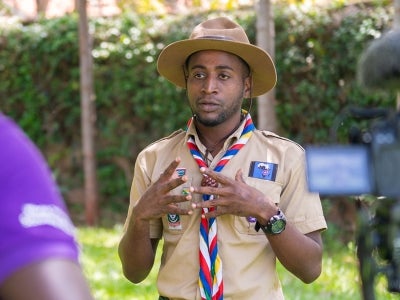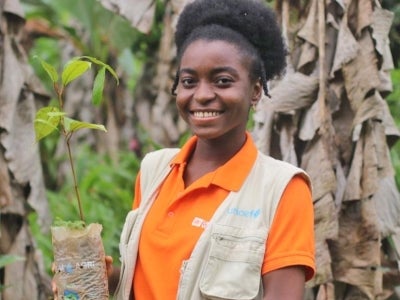
Photo courtesy of Prisca Daka
Prisca Daka is an animal welfare and biodiversity advocate from Zimbabwe, regional co-coordinator of the Global Youth Biodiversity Network (GYBN), and the founder of the Zimbabwe Youth Biodiversity Network. In an interview ahead of the GEF Assembly, she spoke about the urgency underpinning her activism connecting young people across Africa.
What subject area are you focused on?
Biodiversity conservation, animal welfare, and youth engagement.
How did you get into this line of work?
I grew up in a home where nature was valued and appreciated. Fond memories of exploring national parks and experiencing wildlife in Zimbabwe inspired me to work towards their preservation. As a result, I naturally gravitate toward organizations and individuals making an impact on the environment.
Can you share some highlights from your efforts?
Since taking on the role of GYBN Africa regional co-coordinator, I've had the privilege of assisting 11 inspiring young people to establish GYBN chapters within their respective countries. As a result, the total number of GYBN chapters across Africa has grown to 36. This accomplishment is a testament to the inspiring dedication of our network, and our youth advocacy efforts across Africa including organizing self-led youth consultations on the Post-2020 Global Biodiversity Framework and the upcoming 2nd Annual African Youth Summit on Biodiversity, being organized in partnership with the Post-2020 Biodiversity Framework-EU Support Project and the African Wildlife Foundation.
Another notable accomplishment was the high number of African youth representatives at COP15. We saw the highest-ever participation of African youth delegates at a Convention on Biological Diversity summit, cementing our position as a powerful force and voice of influence for biodiversity protection.
Closer to home, the growth and influence of the Zimbabwe Youth Biodiversity Network (ZYBN) is something I am very proud of. From our humble beginnings in 2018, we've managed to emerge as a recognized stakeholder in the field. This accomplishment would not have been possible without the collaborative efforts of our team. The recognition we've gained from our biodiversity focal point and the Ministry of Environment, Climate, Tourism and Hospitality Industry is a testament to the impact we've been able to make. One particularly rewarding endeavor was the youth engagement workshop organized by ZYBN in 2022 in preparation for COP15. The fact that key representatives from the ministry attended underlined the significance of our efforts in mobilizing youth for biodiversity advocacy in Zimbabwe. Our engagement efforts span both urban and rural areas, and we have also initiated a project in Zimbabwe's Eastern Highlands to collaborate with the local community to shed light on the imperative of safeguarding the unique Samango monkey. This initiative has not only raised awareness but also emphasized the need for action to protect this remarkable species.
Looking ahead, we're eagerly anticipating our participation in the consultation process to renew Zimbabwe's National Biodiversity Strategies and Action Plan and engage youth in the implementation of the Kunming-Montreal Global Biodiversity Framework. This is consistent with our goal to push for transformative change and protect our country's rich biodiversity. Importantly, this commitment is shared by our sister chapters around the region, illustrating the collective drive of African youth for biodiversity to have a positive impact on our environment.
If you could say one thing to today’s political or business leaders, what would it be?
Make decisions based not only on short-term economic gains but on long-term benefits for the environment. Recognize that protecting biodiversity is not just a moral obligation but an essential of sustainable development and a healthy future for generations to come. Ecosystems and their biodiversity hold the key to life on this planet. There is no time to wait – the loss of biodiversity has far-reaching consequences for the health of our planet and the well-being of all living beings.
What are your other interests or hobbies?
Apart from work, I enjoy hiking, especially when it involves chasing waterfalls. There is something satisfying about a hike culminating in the breathtaking reward of a waterfall. Spending time outdoors in nature brings me immense joy and serves as a constant reminder of why I'm so committed to advocating for the preservation of these natural spaces. It's not just about the enjoyment we, as humans, experience in these natural settings, but also about recognizing the vital importance of these places for the diverse array of non-human species that share this planet with us.
What are you looking forward to at the GEF Assembly?
I am looking forward to the prospect of strengthening meaningful youth engagement in conservation efforts and emphasizing the need to establish youth-led funding mechanisms. These mechanisms can empower young people to have a more significant role in the decision-making processes and the distribution of funds related to biodiversity and the environment.


